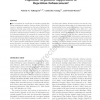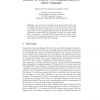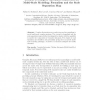1040 search results - page 38 / 208 » A relational model of cognitive maps |
JOCN
2010
13 years 6 months ago
2010
■ We investigated the neural basis of repetition priming (RP) during mathematical cognition. Previous studies of RP have focused on repetition suppression as the basis of behavi...
TRS
2008
13 years 7 months ago
2008
A popular view is that the brain works in a similar way to a digital computer or a Universal Turing Machine by processing symbols. Psychophysical experiments and our amazing capabi...
ER
2006
Springer
13 years 11 months ago
2006
Springer
One of the main drawbacks of the Semantic Web is the lack of semantically rich data, since most of the information is still stored in relational databases. In this paper, we presen...
GEOINFO
2003
13 years 9 months ago
2003
One of the main challenges for the development of spatial information theory is the formalization of the concepts of space and spatial relations. Currently, most spatial data struc...
ICCS
2007
Springer
14 years 1 months ago
2007
Springer
Complex Automata were recently proposed as a paradigm to model multi-scale complex systems. The concept is formalized and the scale separation map is further investigated in relati...



